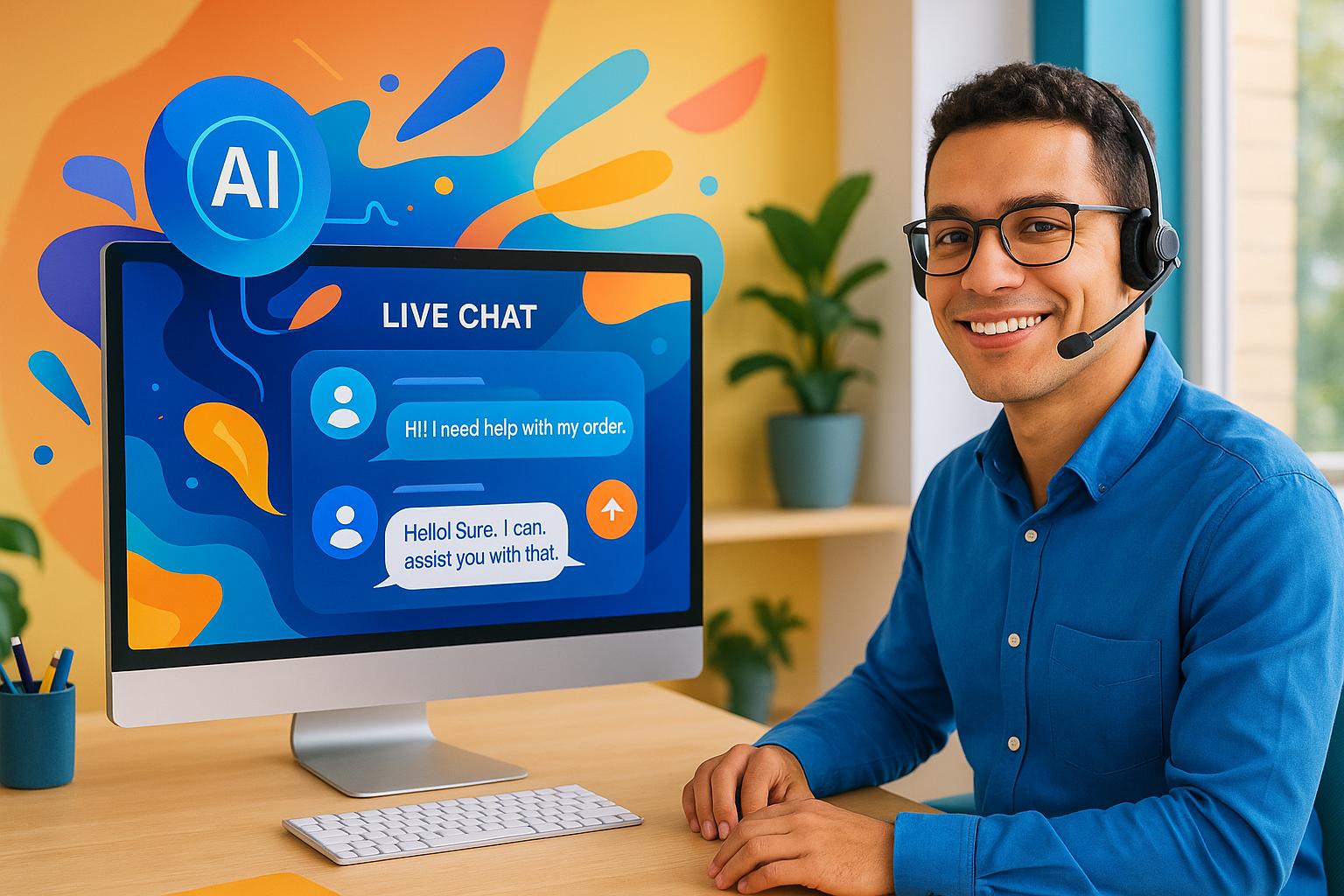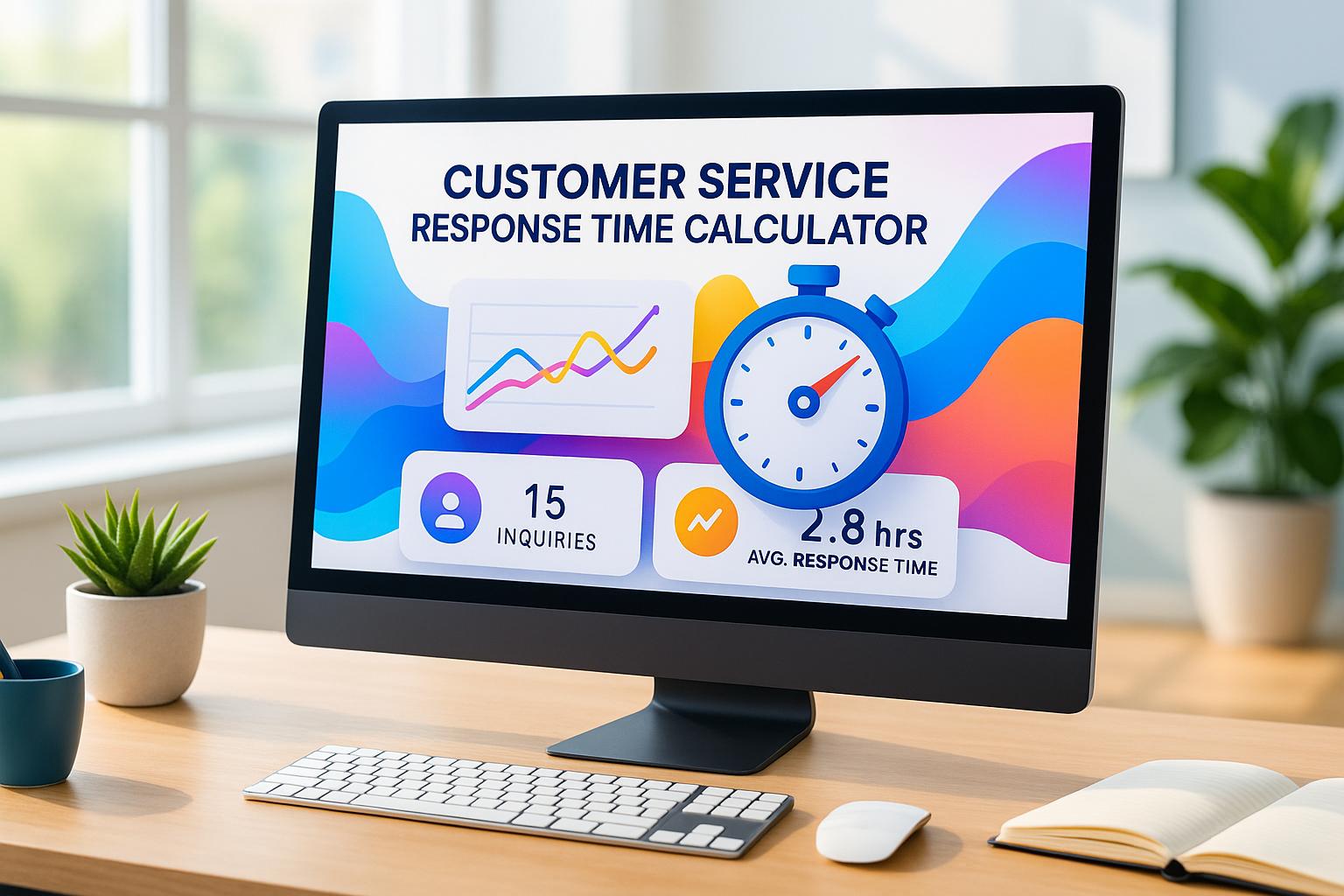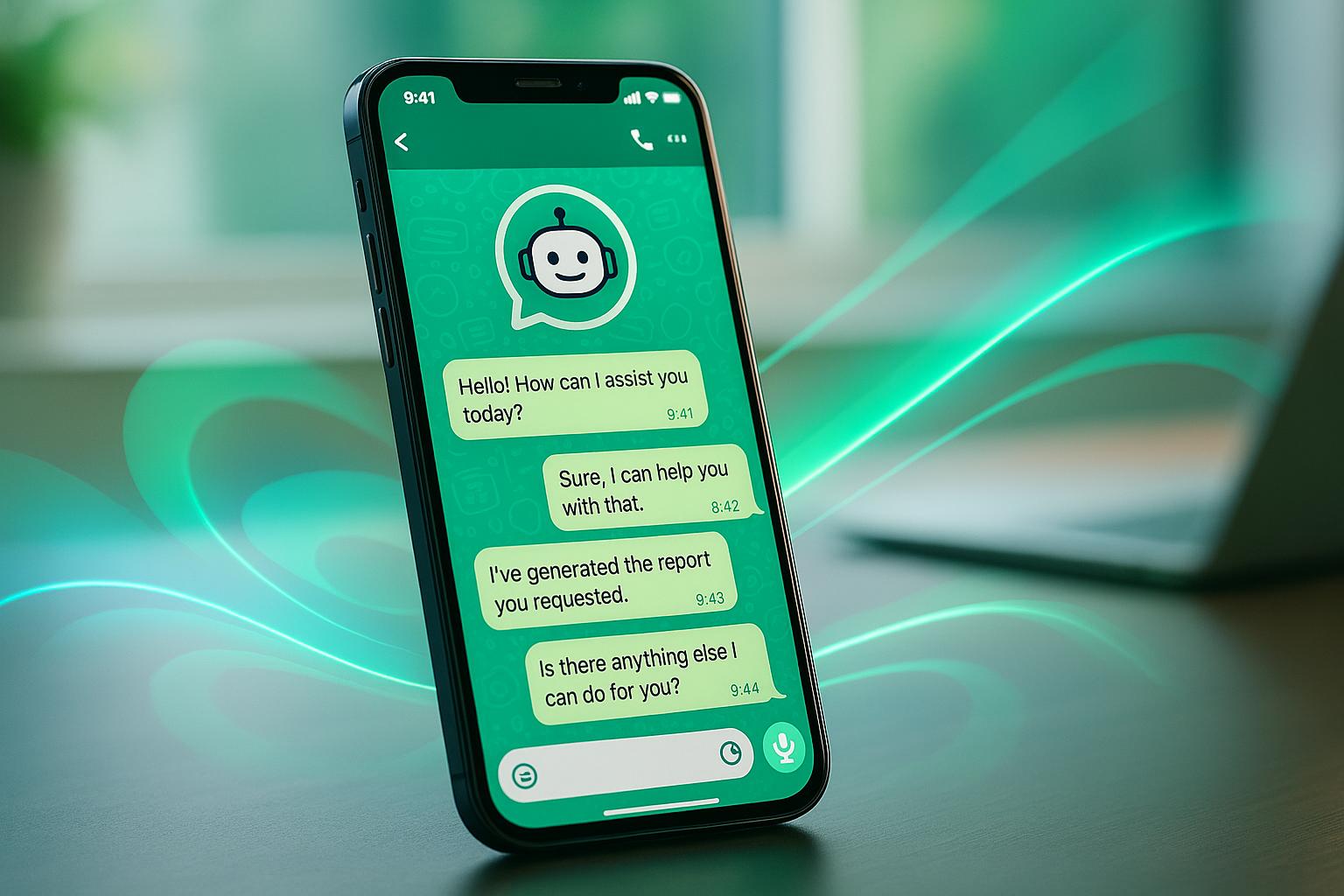
WhatsApp is now a key communication channel for businesses, with over 100 million users in the U.S. and 82% of consumers expecting instant responses. However, the standard WhatsApp Business app has major limitations for scaling operations and integrating AI-driven customer support. Businesses looking to automate and enhance customer interactions should use the WhatsApp Business API, which supports AI integration, advanced automation, and team collaboration.
Converso, a Meta Tech Provider partner, simplifies API integration and offers a unified inbox for managing WhatsApp, SMS, and website chats. This setup allows businesses to automate routine tasks, improve response times, and deliver 24/7 customer support while maintaining high security and compliance standards.
With 61% of customer interactions shifting to messaging platforms by 2025, integrating AI with WhatsApp through the Business API is not just a smart move - it’s essential for staying competitive.
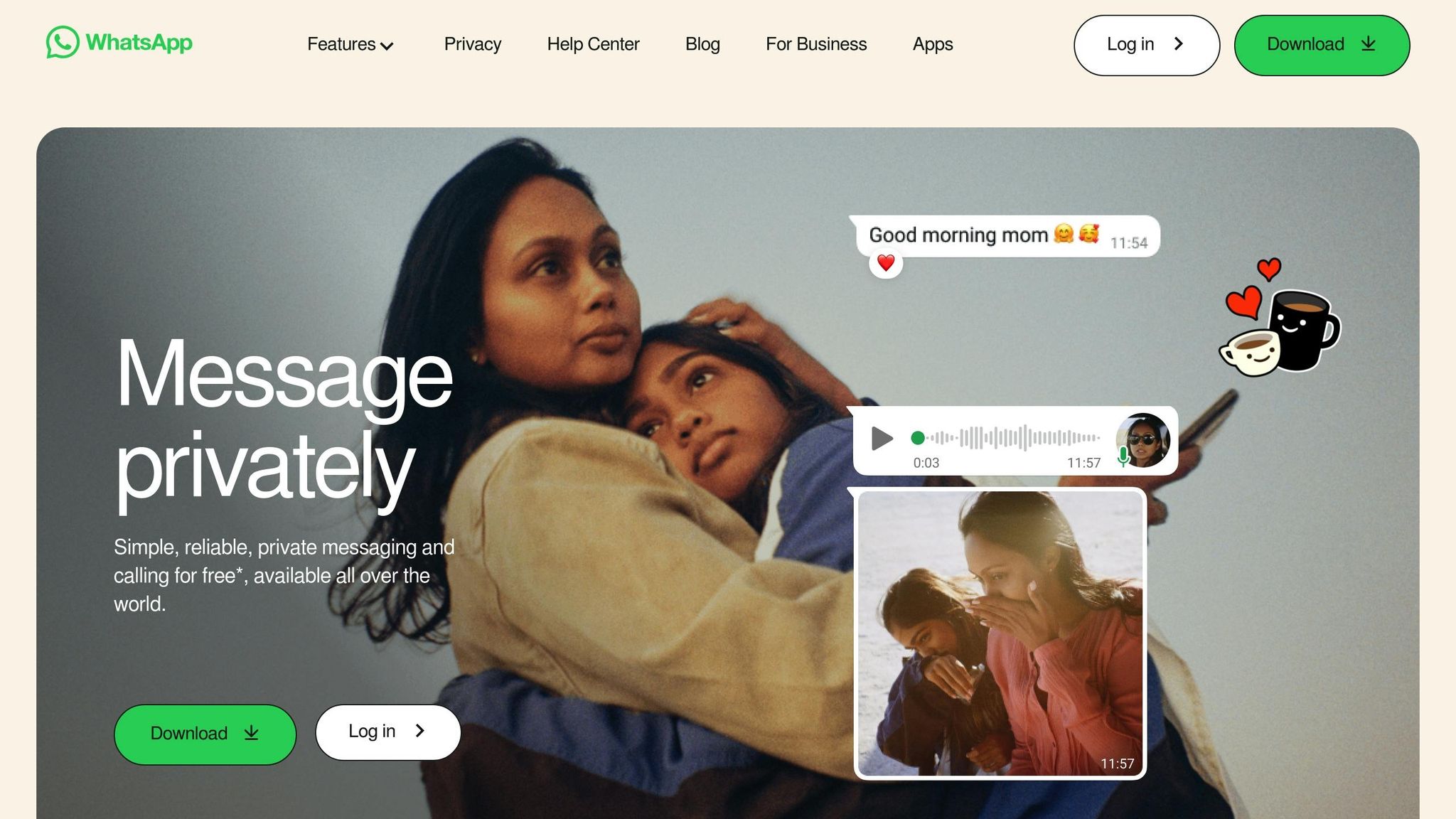

The WhatsApp Business app is useful for basic customer interactions, but it falls short when it comes to supporting AI-driven solutions. These technical shortcomings become major obstacles for companies aiming to scale their customer service or implement automated systems.
One of the biggest drawbacks of the WhatsApp Business app is its lack of API integration [1]. Without API access, AI systems can't interact with or respond to customer messages automatically, making automation impossible.
The app operates in isolation [1], which means AI tools can't tap into WhatsApp conversations. This forces teams to manually manage every message, creating a bottleneck that undermines the efficiency AI is supposed to bring to customer service.
This limitation is particularly frustrating given that WhatsApp messages have an open rate of nearly 90% [2]. Businesses are unable to take full advantage of this highly effective communication platform because the app doesn't support the necessary technical connections. These API restrictions also stifle collaboration, compounding the challenges, as discussed in the next section.
The app has clear restrictions that hinder growth, including support for only one phone, up to four linked devices, and broadcast lists capped at 256 contacts [1] [3]. These limitations make team collaboration difficult and restrict scalability as customer bases grow.
As message volumes increase, these challenges become more pronounced. Customer data is trapped within the app, making it hard for team members to coordinate responses effectively [1]. The absence of robust team management tools often leads to slower response times and inconsistent service quality, which can negatively affect customer satisfaction. Beyond these growth constraints, the app also lacks essential automation features, as outlined below.
The app's automation capabilities are minimal, limited to basic greeting and away messages [1] [3]. This makes it impossible to deploy advanced chatbots or create dynamic workflows. Without integrations with CRM systems or other business tools, customer data can't be synced, forcing teams to rely on manual responses. This is a missed opportunity, as AI could reduce response times by up to 40% [4].
The result is a system where staff spend too much time managing messages manually, leading to inefficiencies and inconsistent customer experiences.
The WhatsApp Business API breaks away from the limitations of the standard app, offering businesses the tools they need to implement advanced AI-driven customer service. This platform goes beyond basic messaging, enabling businesses to create smarter, more efficient systems for customer interactions.
With the WhatsApp Business API, businesses can directly link their AI systems to WhatsApp conversations. This allows for real-time responses and tailored workflow management. AI agents can instantly process customer messages and reply without needing manual input, streamlining the entire communication process.
What sets this apart is the API's ability to maintain a conversational and personal tone[7]. Unlike generic email responders, AI agents using this platform deliver context-aware responses that feel natural and engaging to customers.
For example, Educenter, an educational institution in Israel, automated its student support services using the API. From onboarding to handling live queries, they saved over 100 hours every month[7].
The API also integrates seamlessly with CRM systems, consolidating all customer communications into a single view. This unified approach not only simplifies team coordination but also ensures a smoother workflow[5].
The WhatsApp Business API is designed to scale with businesses. It supports unlimited agents and devices on a single WhatsApp number, making it ideal for growing teams and increasing message volumes[7].
Team members can share message handling responsibilities, and centralized chat histories ensure consistent service across all interactions. This means customers receive the same level of quality no matter who responds.
Puma demonstrated these benefits by implementing Wavetec's WhatsApp Queuing Solutions. This allowed their customers to inquire about product availability, sizing, and pricing directly through WhatsApp, leading to stronger customer relationships and higher satisfaction rates[6].
The API also provides valuable analytics, such as message delivery and read rates, as well as performance metrics for marketing campaigns[6]. These insights help teams fine-tune their strategies, ensuring efficient and effective customer engagement.
Combining advanced integration and team management, the API significantly improves the customer experience. It ensures timely, personalized support and enables businesses to switch seamlessly between AI and human agents when needed. With the API, businesses can offer 24/7 support, something traditional customer service channels often can't match[6].
The numbers highlight its impact: WhatsApp messages boast a 98% open rate and a 57% click-through rate. Additionally, 83% of customers prefer using messaging apps like WhatsApp to explore products, and 75% go on to make purchases[7].
Sattvic, an online retail marketplace, used the API to achieve impressive results. They reduced return-to-origin rates by 25% and doubled the number of chats handled. By segmenting their customers, they sent targeted product recommendations, deals, and discounts, driving engagement and sales[7].
Security is another crucial advantage. Features like end-to-end encryption and two-factor authentication ensure that sensitive customer information remains protected[5][6]. Combined with WhatsApp's familiar interface, this creates a trustworthy and comfortable environment for users.
Additionally, brands that collect feedback through WhatsApp see response rates up to 40% higher compared to traditional survey methods[7]. This improved engagement provides businesses with deeper insights, enabling them to refine their services and better meet customer needs.

Converso leverages the power of the WhatsApp Business API to bring AI-driven customer support directly to the platform. By simplifying the integration process, Converso ensures businesses can deploy AI agents on WhatsApp efficiently, offering a reliable and effective solution for customer service.
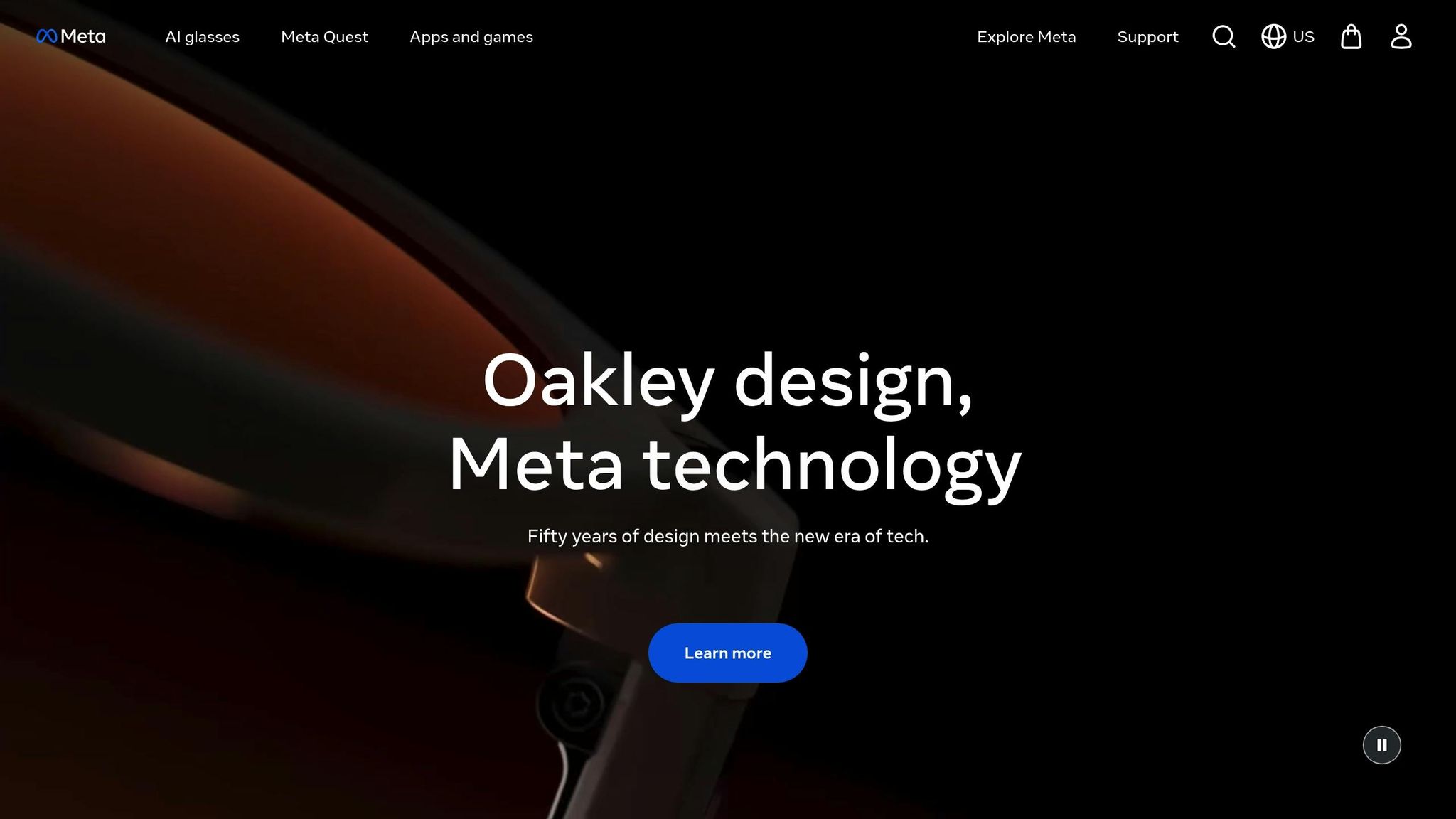
As a Meta Tech Provider partner, Converso offers businesses direct access to the WhatsApp Business API, removing common integration hurdles. This partnership reflects Converso's successful completion of Meta's rigorous verification process, confirming compliance with WhatsApp's business standards [8].
With this designation, Converso can onboard businesses directly to the WhatsApp Business Platform and access WhatsApp data through official APIs [8]. This partnership strengthens Converso's ability to deliver a fully integrated, AI-powered WhatsApp experience.
WhatsApp has over 3.031 billion monthly active users [9], making this partnership essential for businesses aiming to connect with customers where they spend their time. Additionally, Converso benefits from an embedded signup flow, simplifying the onboarding process for new clients [9].
Converso goes beyond WhatsApp, offering businesses a unified communication hub that connects AI agents across WhatsApp, website chat, and SMS. This multi-channel approach ensures businesses can engage with customers wherever they prefer to communicate.
A unified inbox, which consolidates messages from all channels, has been shown to increase engagement by 18% [10]. For businesses, this means improved reach and more efficient service.
The platform's centralized inbox eliminates the need for agents to toggle between tools, ensuring consistent responses across all channels. This setup allows teams to manage conversations seamlessly, retaining context and customer history regardless of the platform used.
Converso's AI helpdesk automates routine tasks while ensuring smooth transitions to human agents when needed. The shared inbox keeps the conversation context intact, so customers don’t have to repeat themselves or start over.
The platform is designed with GDPR compliance, addressing data protection requirements crucial for businesses in regulated industries. Features like chat transcripts and customer portals provide the documentation and transparency necessary for quality assurance and compliance reporting.
With a customizable flow builder, businesses can tailor conversation paths to suit their specific needs. Whether it’s managing product inquiries, booking appointments, or handling support tickets, the AI adapts to follow company-specific protocols while maintaining a natural, conversational tone that fits WhatsApp's user experience.
Converso also integrates workflow automation, enabling actions like CRM updates, follow-up messages, and customer record maintenance to occur automatically. This transforms the platform into a complete customer service ecosystem, far exceeding the capabilities of a standard messaging tool. These features position Converso as a comprehensive solution for delivering exceptional customer support on WhatsApp.
To get the most out of the WhatsApp Business API, it's essential to follow some key practices when deploying AI. Proper execution not only ensures compliance but also boosts team efficiency and enhances customer satisfaction. These strategies help businesses sidestep common mistakes and make the most of AI-powered customer interactions.
Handling customer data responsibly is the cornerstone of any WhatsApp AI deployment, especially under regulations like GDPR and CCPA. Here’s how to ensure compliance while maintaining a smooth customer experience:
"Ensure that AI tools comply with applicable regulations, such as GDPR and CCPA. Conduct regular audits, maintain compliance documentation, and communicate data collection practices clearly to users. These steps provide evidence of due diligence in the event of a regulatory inquiry." – Nihad A. Hassan, Independent Cybersecurity Consultant [11]
Once data privacy measures are in place, the next step is preparing your team to work effectively alongside AI.
A well-prepared team is essential for managing AI interactions effectively. Here’s how to set them up for success:
With a trained team, the focus can shift to designing a customer experience that prioritizes their needs.
A customer-centered approach ensures that AI interactions feel natural and helpful. Here are some ways to design with the customer in mind:
Opting for the WhatsApp Business API instead of the basic app is a game-changer for deploying AI agents effectively. The basic app simply doesn’t have the capacity for multi-agent interactions, CRM integration, or advanced automation features [18]. Without the API, businesses miss out on smooth handoffs, centralized team management, and the ability to scale customer interactions efficiently.
The Business API elevates customer service by driving engagement, with message open rates reaching an impressive 98% [17]. It allows companies to automate support, maintain conversation continuity during handoffs, and scale operations without overwhelming their teams.
Converso takes these benefits even further. Its seamless integration and unified inbox simplify the process of deploying AI across different channels [16]. These tools not only make operations more efficient but also enhance the overall customer experience. Aaron Valente, Director at Key Health Partnership, highlighted this impact:
"Converso's AI helpdesk has reduced the volume of insurance policy queries that the support team answer by at least 50%, through easy integration of our AI Agent with our human agents. Together with a future use for lead gen, it has the potential to revolutionize our business!" [16]
Cutting query volumes by 50% while maintaining exceptional service levels showcases the potential of a well-executed WhatsApp AI strategy. With the right tools and practices, AI-driven WhatsApp support can become a scalable edge in a competitive market.
The real question isn’t whether businesses should integrate AI with WhatsApp - it’s how fast they can implement it to transform their customer experience.
The WhatsApp Business API provides tools that go beyond what the standard WhatsApp Business app can offer. By using the API, businesses can integrate AI agents and chatbots to manage automated conversations on a larger scale. This includes features like programmatic messaging and seamless connections to CRM systems, making it easier to manage and utilize customer data effectively.
While the standard app doesn’t support automation or API integrations, the API enables a smooth handoff between AI-driven interactions and human representatives. This ensures conversations remain efficient while still feeling personalized for customers.
The WhatsApp Business API uses end-to-end encryption, ensuring that messages stay private and are accessible only to the sender and recipient. This level of encryption helps keep sensitive information safe during communication.
Beyond encryption, the platform employs advanced security measures, efficient operational processes, and a dedicated team to safeguard customer data. It’s built to align with global data privacy standards like GDPR, ensuring data is handled securely and responsibly.
With these protections in place, the WhatsApp Business API offers a secure and trustworthy option for managing customer interactions.
To prepare your team for working with AI agents on WhatsApp using the Business API, start by offering clear instructions on managing AI-generated responses and ensuring smooth transitions to human agents when needed. It's also essential to train them on troubleshooting frequent issues and navigating customer interaction workflows effectively.
Keep your team informed about updates to the API and share best practices regularly. This helps them stay sharp and confident, leading to better operational performance and a more seamless customer experience through responsive and efficient communication.

